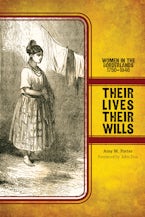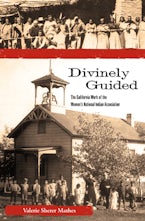Women, Gender, and the West
A scholarly book series that seeks to interrogate and expand the boundaries between gendered constructions of self, space, identity, and place, particularly as related to the American West.
Showing results 1-3 of 3
Filter Results OPEN +

What Is Gone
Price: $29.95
ISBN: 9781682830000
Pub Date: July 2017
What Is Gone is a story of violence and nostalgia, the inextricable connections between identity and place, narrated by a woman who grew up in the comforting cultural geography of Lincoln, Nebraska, a town that made her feel so safe she became almost incapable of comprehending danger. Even after her own encounter with violence--a brutal rape in nearby Omaha in 1985--she returns to her hometown convinced that it was the city she remembered, department stores staffed by familiar clerks, the buildings themselves repositories of comforting memories. But then, in the fall of 1992, Candice Harms, a first-year student at the University of Nebraska, disappears. This harrowing mystery, combined with evidence that the Lincoln she has known is disappearing--stores closing, her beloved downtown becoming strangely vacated--compels Brown to reconsider what she'd grown up accepting as truth. What Is Gone, centered in Nebraska but connecting to the larger landscape of the nation,...
Their Lives, Their Wills
Women in the Borderlands, 1750-1846
Price: $39.95
ISBN: 9780896729322
Pub Date: June 2015
In 1815, in the Spanish settlement of San Antonio de Béxar, a dying widow named María Concepción de Estrada recorded her last will and testament. Estrada used her will to record her debts and credits,...
Divinely Guided
The California Work of the Women's National Indian Association
Price: $39.95
ISBN: 9780896727458
Pub Date: April 2012
Founded in Philadelphia in 1879, the Women’s National Indian Association devoted seventy years to working among Native women. Bucking society’s narrow sense of women’s appropriate sphere, WNIA members across the U.S. built Indian homes, missionary cottages, schools, and chapels; supported government teachers and field matrons; and funded physicians—all with a strong dose of Christianity. Though goals of forced assimilation were as unrealistic as they were unsuccessful, WNIA’s contributions to the welfare of Native women were hardly insignificant, especially in California. In the north, they worked at the Round Valley and Hoopa Reservations and realized their most unusual undertaking—the funding of the Greenville Indian Industrial School. In the south they worked with the Native mission populations, where cultural similarities and greater proximity fostered unprecedented cooperation among WNIA workers. Amelia Stone Quinton, longtime WNIA president and editor of The Indian’s Friend, provides a consistent narrative thread, as does Helen Hunt Jackson in...

What Is Gone
Price: $29.95
ISBN: 9781682830000
Pub Date: July 2017
What Is Gone is a story of violence and nostalgia, the inextricable connections between identity and place, narrated by a woman who grew up in the comforting cultural geography of Lincoln, Nebraska, a town that made her feel so safe she became almost incapable of comprehending danger. Even after her own encounter with violence--a brutal rape in nearby Omaha in 1985--she returns to her hometown convinced that it was the city she remembered, department stores staffed by familiar clerks, the buildings themselves repositories of comforting memories. But then, in the fall of 1992, Candice Harms, a first-year student at the University of Nebraska, disappears. This harrowing mystery, combined with evidence that the Lincoln she has known is disappearing--stores closing, her beloved downtown becoming strangely vacated--compels Brown to reconsider what she'd grown up accepting as truth. What Is Gone, centered in Nebraska but connecting to the larger landscape of the nation,...
Their Lives, Their Wills
Women in the Borderlands, 1750-1846
Price: $39.95
ISBN: 9780896729322
Pub Date: June 2015
In 1815, in the Spanish settlement of San Antonio de Béxar, a dying widow named María Concepción de Estrada recorded her last will and testament. Estrada used her will to record her debts and credits,...
Divinely Guided
The California Work of the Women's National Indian Association
Price: $39.95
ISBN: 9780896727458
Pub Date: April 2012
Founded in Philadelphia in 1879, the Women’s National Indian Association devoted seventy years to working among Native women. Bucking society’s narrow sense of women’s appropriate sphere, WNIA members across the U.S. built Indian homes, missionary cottages, schools, and chapels; supported government teachers and field matrons; and funded physicians—all with a strong dose of Christianity. Though goals of forced assimilation were as unrealistic as they were unsuccessful, WNIA’s contributions to the welfare of Native women were hardly insignificant, especially in California. In the north, they worked at the Round Valley and Hoopa Reservations and realized their most unusual undertaking—the funding of the Greenville Indian Industrial School. In the south they worked with the Native mission populations, where cultural similarities and greater proximity fostered unprecedented cooperation among WNIA workers. Amelia Stone Quinton, longtime WNIA president and editor of The Indian’s Friend, provides a consistent narrative thread, as does Helen Hunt Jackson in...



